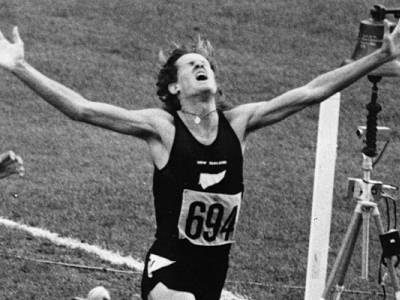It is with great sadness that the New Zealand Olympic Committee learned of the passing of double Olympic gold-medallist rowing coxswain Simon Dickie.
66 year old Dickie was part of New Zealand's first gold-winning rowing crew, coxing the four which took gold at the 1968 Olympic Games in Mexico. He was only 17 years old at the time.
Dickie followed that up in 1972 as part of the coxed eight, which won gold in Munich.
Four years later he won a bronze medal at the 1976 Olympics in Montreal.
NZOC President Mike Stanley says Dickie was an inspiration to a generation of New Zealanders.
“With 2 gold medals won in successive games and a bronze medal Simon was one of our most celebrated Olympians,” said Mike.
“He was plucked from obscurity to become the inspirational voice of the 1968 coxed four and the eight in 1972.”
“He returned to the coxswains seat to guide the eights to bronze in 1976. He was a great Olympian and will be sorely missed. On behalf of all of us at the NZOC we pass on our heartfelt condolences to Simon’s family and friends.”
Dickies journey into high performance rowing began when he was drafted into the national rowing squad fresh out of Wanganui Collegiate.
He made the four for the Mexico City 1968 Olympic Games, initially as back up cox.
The four, made up of stroke Dick Joyce, Dudley Storey, Ross Collinge and Warren Cole, plus cox Dickie – made a strong start to the games, winning their heat and semi-final.
In the final they pushed their bow ahead at 300 metres and continued to attack, winning by nearly three seconds over East Germany and Switzerland. That was the last time they raced together – three races, three victories, and the gold medal.

Above: The fours after winning gold in 1968
Dickie went on to become one of the senior figures of the rowing group.
In 1971 he coxed a revamped eight to victories in international races at Duisburg, Germany, and Klagenfurt, Austria. When the eight beat the feared East Germans to win the European title at Copenhagen, they were awarded the International Olympic Committee’s Taher Pacha Trophy for excellence in amateur sport.
Dickie then did an outstanding job as cox of the eight-oar crew that won the gold medal at Munich so dramatically.
The New Zealand eight outclassed a quality field to win by nearly three seconds, over the Americans and East Germans. This was a significant victory for the “amateur” New Zealanders over the “professional” northern hemisphere crews, and, significantly, the medals were presented by IOC chief Avery Brundage.
New Zealand’s rowing stocks were never higher than that emotional day at Feldmoching when the eight – Tony Hurt, Wybo Weldman, Dick Joyce, John Hunter, Lindsay Wilson, Athol Earl, Trevor Coker, Gary Robertson and Dickie – stood on the dais, gold medals around their necks, listening to God Defend New Zealand while they shed tears of joy.

Above: The eights in 1972

Dickie retired from rowing soon after, but was induced to return for a crack at the 1976 Olympics at Montreal. Though the eight there was not the smooth machine of years previously, Dickie still added a bronze medal to his Olympic collection.
Outside the Olympic arena, Dickie had many other successes, including an eights bronze medal at the 1970 world championships at St Catharines, Canada, and an eights gold medal at the 1971 European championships at Copenhagen.
Dickie won two national titles, with the Wellington eight in 1970 and the Wellington four in 1972.
Dickie went on to be based in Taupo and was involved in adventure tourism.
Dickie led groups from New Zealand to Australia and also from the United States to England and from Australia to South America.
The 1968 coxed four and 1972 eight that Dickie coxed to Olympic golds were inducted into the New Zealand Sports Hall of Fame in 1990. The eight that won the world title in 1971 and the Olympic gold in 1972 won the New Zealand Sportsman of the Year award in consecutive years.
Further information about Dickies historic races can be found at the below link:
http://www.olympic.org.nz/news/the-black-singlet-shaping-our-brand-1968-1980/
Montreal 1976 Munich 1972 Mexico City 1968 Olympic Summer Games Simon Dickie RowingTweet Share

